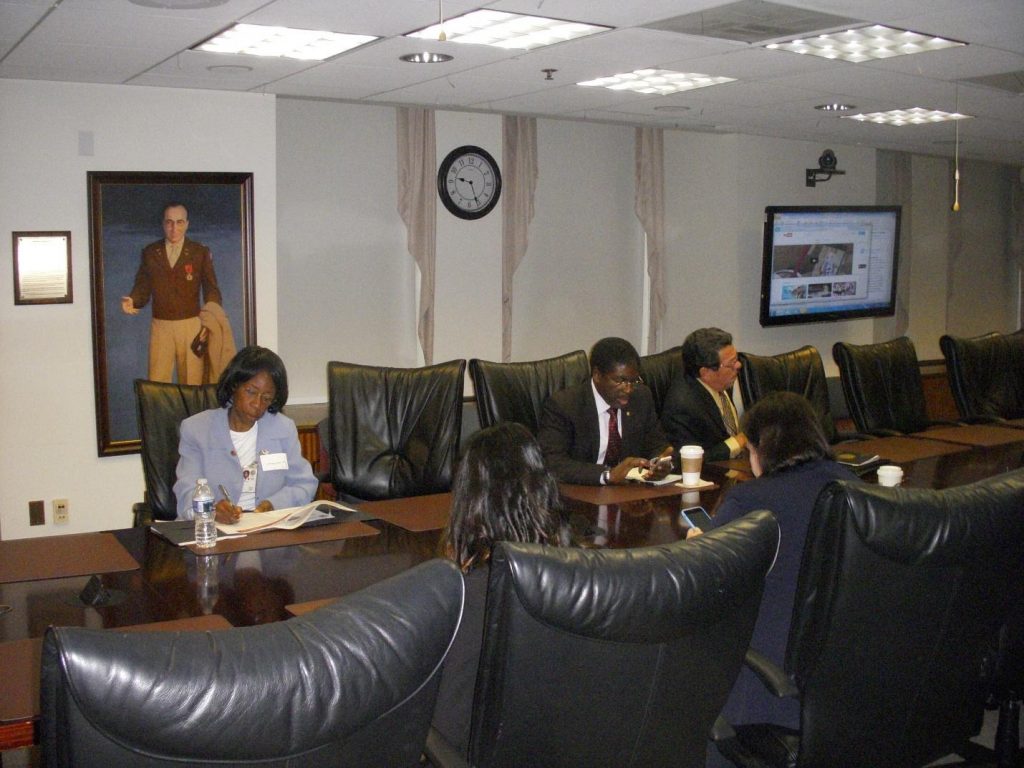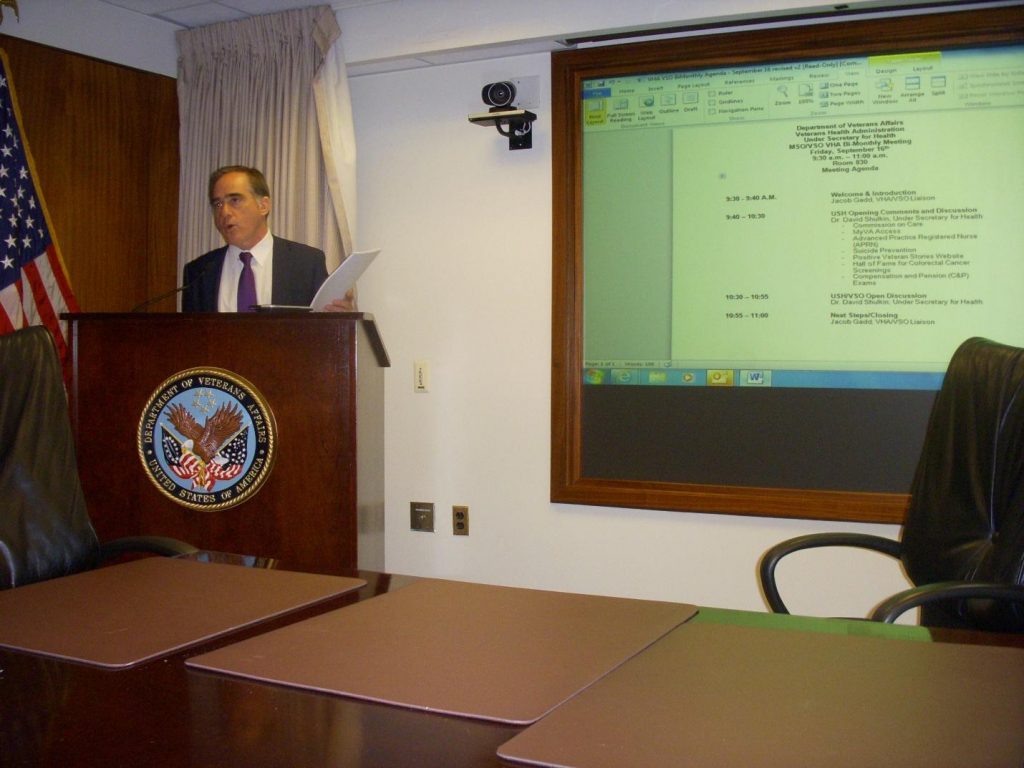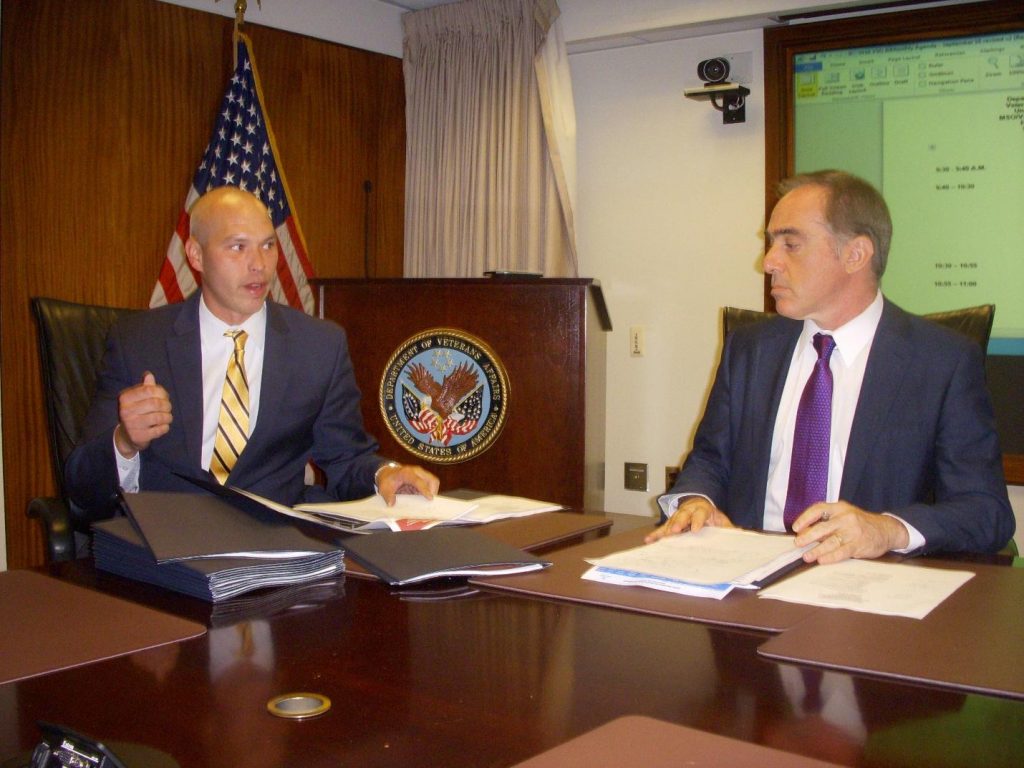On Friday, September 16, 2016, the Veterans Health Administration (VHA) and Veterans Service Officer (VSO) Bi-Monthly Meeting was held at the U.S. Department of Veterans Affairs Central Office in Washington, D.C., to review and provide recommendations to the VHA: “Top 15 Things the Veterans Health Administration Is Doing to Improve Access, Care, Timeliness and Quality for Veterans and Their Families” nationwide. See attached VHA Vitals at the end of this report. NAAV’s president and chief executive officer along with other VSO and partnering agencies were present at the meeting to provide recommendations. This meeting was followed by a conference call on Tuesday, September 20, 2016.

The welcome and introduction for the meeting was presented by Jacob Gadd, VHA/VSO Liaison at the Central Office, U.S. Department of Veterans Affairs in Washington, D.C. The host of the open discussion at the meeting, Dr. David Shulkin, Under Secretary of Health, opened the meeting with an overview of the Veterans Health Administration’s priorities for strategic action:
(1) Access to any Veteran with the requirement for urgent care to receive care at the right time appropriate to his or her clinical needs;
(2) Employment Engagement to allow staff to have greater input into their work environment;
(3) High Performance Network to build a high performance network of care to best serve Veterans;
(4) Best Practices, seeking to identify and disseminate best practices throughout the VA;
(5) Trust in the VA Care, to share results on the quality and timeliness of how we care for Veterans.
Other subjects discussed included My VA Access, advanced practice Registered Nurse, Suicide Prevention, Positive Veterans Stories Website, Hall of Fame for Colorectal Cancer Screenings, and Compensation and Pension (C&P) Exams.

NAAV’s president and chief executive officer recommended providing spiritual support providers to help Veterans and their families experiencing complex medical problems, financial hardships, and marital problems. Military family caregivers make great sacrifices without complaint, and they don’t usually ask for assistance, because they’re trained to face the challenges and get the job done. To them, caregiving is a labor of love and devotion, but that alone does not ease the burden and personal stress placed on those who provide daily for the disabled Veteran. Often the Veteran’s family financial hardship can lead to marital problems, unemployment, divorce, and even suicide. This is why NAAV’s mission is to reach out to military families and encourage them as they help their loved ones move toward a healthy reintegration into society. We also offer claims and benefits assistance, counseling, legal, employment, respite care assistance, and other emergency assistance resources and referrals to Veterans and their family members nationwide. Additionally, NAAV provides spiritual wellness counselors and literature on its website for visitors in need of encouragement and comfort.
On Friday, September 23, 2016, NAAV president and chief executive officer attended the Roundtable Discussion “Preventing Veteran Suicide Is Everyone’s Business,” at the Central Office, U.S. Department of Veterans Affairs, in Washington, D.C. The moderator was Kacie Kelly, MHS, Senior Program Manager, Mental Health Strategic Partnerships, and the chair of the meeting was Caitlin Thompson, Ph.D., Director, VA Suicide Prevention Office, Central Office, Washington, D.C. The partnering agencies and veteran’s service organizations discussed some of the salient issues and strategized opportunities for collaboration. Partnering agencies and organizations will disseminate via website the VA YouTube links to the videos to expand these resources to Veterans’ communities nationwide.
The VHA/VSO Bi-Monthly Meeting held follow-up conference calls with Dr. Shulkin and Jacob B. Gadd, VHA/VSO Liaison, Office of the Secretary for Health, VHA, as a follow-up to questions raised at the meeting to include three VA Mental Health and Chaplaincy subject matter experts to discuss the VA’s current efforts to integrate pastoral care into VA care nationally. The subject matter experts included Jason Nieuwsma, Associate Director, VA Mental Health and Chaplaincy with the VA Mid-Atlantic MIRECC; Keith Ethridge, Associate Director, National Chaplain Center, Veterans Health Administration; and Gregory Hughes, SPC/VCL Liaison, National Office of Suicide Prevention.

According to Dr. Shulkin, last year the VA Crisis Line dispatched emergency responders an average of 30 times daily and made 80,000 referrals to suicide prevention coordinators at the medical centers. The coordinators are preventing thousands from committing suicide. However, despite these improvements and deploying assets of the country’s largest integrated medical and behaviors health care system, VA cannot fully address this issue alone. A recent report by the Centers for Disease Control and Prevention showed suicide is rising across all demographics and generations of Americans. As a nation, we must watch out for each other and direct friends, family members, Veterans, and colleagues to the right resources where hundreds of caring professionals are waiting to help those most in need of immediate attention.
If you are a Veteran or the loved one of a Veteran who is experiencing a crisis, the VA provides universal access to 24/7 emergency care through the Emergency Departments and VA’s Veterans Crisis Line. Call 1-800-273-8255 and press 1, text to 838255, or chat online at VeteransCrisisLine.net.
